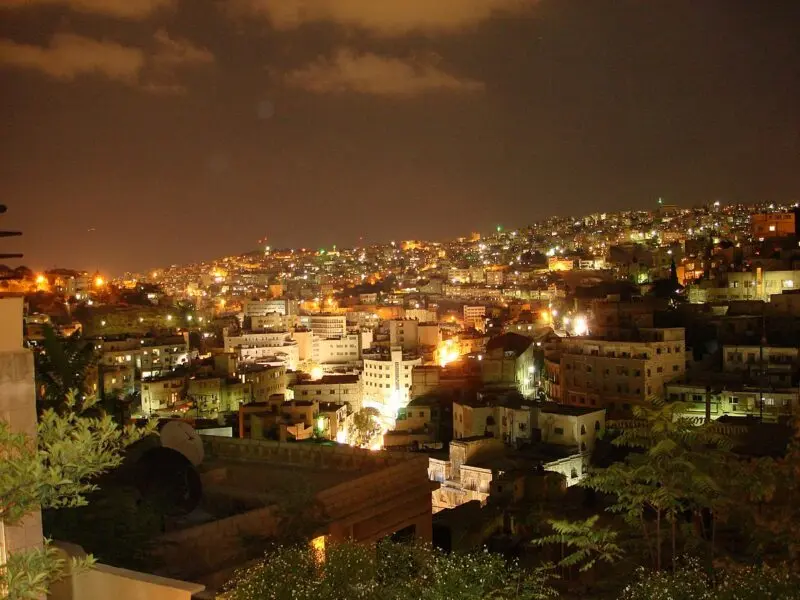
My friend Mohammad and I were sipping Turkish coffee in a café in downtown Amman when the news reached us that Jordan had closed its airspace due to security concerns. This was soon followed by reports that Iran had launched a retaliatory strike on Israel in response to the bombing of its consulate in Damascus. I’d only been in Jordan for 48 hours and I couldn’t help but think that I may have come at a less than auspicious time.
By the time I got home at 2:00 AM the missiles were flying over Amman like comets. I watched from my balcony as they were shot down by the Jordanian air force. The missiles I saw being intercepted were far away in the distance, but the explosions that could be heard as others were brought down sounded much closer. Friends in other parts of the city shared videos of sightings of the deadly balls of fire flying over our heads at much closer proximities.
After an hour or so, the skies cleared, the cheering of enraptured spectators ceased, and silence took hold. Iran had sent over 300 drones and missiles towards Israel. Though there were rumours about them hitting an airport and military installations, it would only become clear in the morning how much damage had been done and, in light of this, how Israel would choose to respond.
Though in some ways it felt that the fate of the world was hanging in the balance, the next day was of course just like any other day. People joked with one another about the “fireworks display” of the previous night, but most were confident that Jordan would be safe. For decades it has been considered an island of stability in the region, insulated from the effects of war by its good relations with its neighbours and close alliance with the USA. I was reassured by their confidence until I read a headline from the Tehran times which quoted an Iranian military source warning that Jordan could be Iran’s “next target” for protecting Israel. I imagine every country sees war as an impossibility until it isn’t.
People joked with one another about the “fireworks display” of the previous night, but most were confident that Jordan would be safe
The following week was tense. Though only a few missiles had penetrated Israel’s air defences, causing limited damage and no deaths, the Israeli war cabinet pledged to respond in a time of their choosing. In the days after the attack, noisy Jordanian air patrols became a common occurrence. The media feverously speculated about how further escalation could tip Israel’s tit for tat with Tehran into a regional conflict or even World War Three.
These were a constant reminder to me that my days in Amman were probably numbered, and I mentally prepared myself for the possibility of having to get out at short notice. Of far greater concern to me was what would happen to my Jordanian friends who, unlike me, would not have any option but to remain here in the event of a conflagration. It was a sobering and guilt-inducing thought.
Though it was hard to avoid furtive and frequent glances at my phone notifications or the TV screens in cafes and restaurants, the moment at least gave me the opportunity to have some interesting conversations. In general, Jordanians are literate in international politics, as they have their own personal connection to the Israel-Palestine conflict which, at times, seems to be at the centre of regional and world events.
People I spoke to were divided on Iran’s attack. Some were heartened to see a Muslim country stand up to Israel militarily, the first time since Iraq attacked it in 1991. Others I’ve spoken to were more sceptical and saw the whole thing as nothing more than “theatre,” with some suggesting it may have even been jointly orchestrated by Iran and Israel.
But even more controversial was what people made of Jordan’s role in the events of that week. King Abdullah is viewed as more politically liberal and personally affable than most authoritarian rulers in the region, but criticism of the monarch remains strictly forbidden. And yet, the role Jordan played in effectively protecting Israel by shooting down the Iranian missiles unleashed a wave of almost unprecedented anger directed against the King and his government. For the first time, I heard some voice criticism of the half-British King for being disconnected from his people and their needs as a non-native Arabic speaker who spent most of his life in the UK before assuming the throne. Though vocal criticism was still rare, it was voiced more often than I had ever heard before on previous visits to the kingdom.
Almost a month on from the Iranian attack, the situation has thankfully deescalated, and the world has forgotten that it felt like we were on the brink of Third World War. But even though fears of a wider war have melted away, this crisis was not inconsequential. For the first time, Israel and Iran’s rivalry has come into the open, no longer limited to strikes on proxies in Syria and Iraq. Now this symbolic line has been crossed, the possibility of all-out war between the two old enemies is now far more likely in the future.


